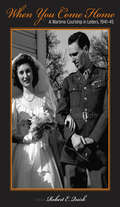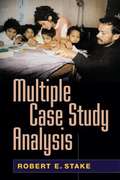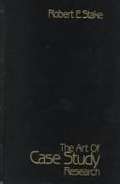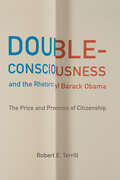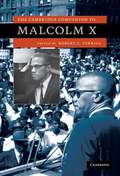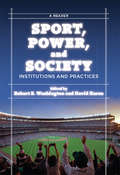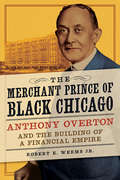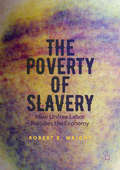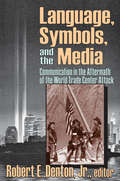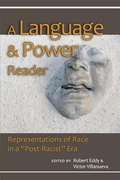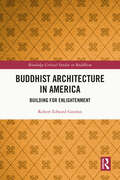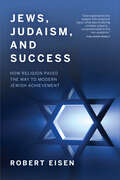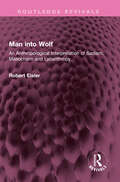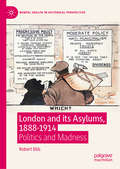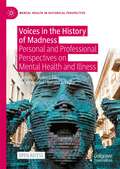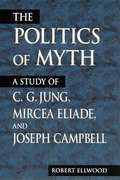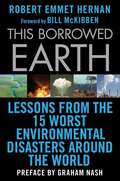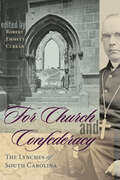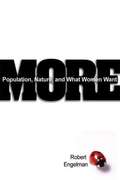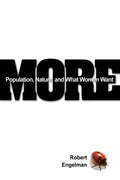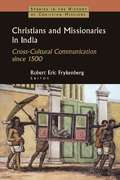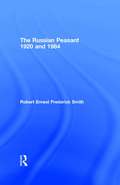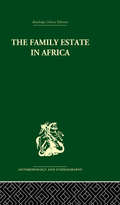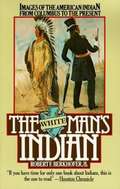- Table View
- List View
When You Come Home: A Wartime Courtship in Letters, 1941-45
by Robert E. QuirkThe story of two Wayne State University students who were separated by World War II, told through the letters that they exchanged.
Multiple Case Study Analysis
by Robert E. StakeExamining situational complexity is a vital part of social and behavioral science research. This engaging text provides an effective process for studying multiple cases--such as sets of teachers, staff development sessions, or clinics operating in different locations--within one complex program. The process also can be used to investigate broadly occurring phenomena without programmatic links, such as leadership or sibling rivalry. Readers learn to design, analyze, and report studies that balance common issues across the group of cases with the unique features and context of each case. Three actual case reports from a transnational early childhood program illustrate the author's approach, and helpful reproducible worksheets facilitate multicase recording and analysis.
The Art Of Case Study Research
by Robert E. Stake<P>This book presents a disciplined, qualitative exploration of case study methods by drawing from naturalistic, holistic, ethnographic, phenomenological and biographic research methods.<P> Robert E. Stake uses and annotates an actual case study to answer such questions as: How is the case selected?<P> How do you select the case which will maximize what can be learned?<P> How can what is learned from one case be applied to another?<P> How can what is learned from a case be interpreted? <P>In addition, the book covers: the differences between quantitative and qualitative approaches; data-gathering including document review; coding, sorting and pattern analysis; the roles of the researcher; triangulation; and reporting.
Double-Consciousness and the Rhetoric of Barack Obama: The Price and Promise of Citizenship (Studies in Rhetoric & Communication)
by Robert E. Terrill“This incisive work” examining Obama’s speeches and the theories of W.E.B. DuBois “illuminates the influences of words and ideas” (Choice).The racial history of US citizenship is vital to our understanding of both citizenship and race. Robert E. Terrill argues that, to invent a robust manner of addressing one another as citizens, Americans must draw on the indignities of racial exclusion that have stained citizenship since its inception. In Double-Consciousness and the Rhetoric of Barack Obama, Terrill demonstrates how President Barack Obama’s public address models such a discourse.Terrill contends that Obama’s most effective oratory invites his audiences to experience a form of “double-consciousness,” famously described by W. E. B. Du Bois as a feeling of “two-ness” resulting from the African American experience of “always looking at one’s self through the eyes of others.” An effect of cruel alienation, this double-consciousness can also offer valuable perspectives on society. When addressing fellow citizens, Obama asks each to share in the “peculiar sensation” that Du Bois described.Through close analyses of selected speeches from Obama’s 2008 campaign and first presidential term, this book argues that Obama does not present double-consciousness merely as a point of view but as an idiom with which we might speak to one another. Of course, as Du Bois’s work reminds us, double-consciousness results from imposition and encumbrance, so that Obama’s oratory presents a mode of address that emphasizes the burdens of citizenship together with the benefits, the price as well as the promise.
The Cambridge Companion to Malcolm X
by Robert E. TerrillMalcolm X is one of the most important figures in the twentieth-century struggle for equality in America. With the passing of time, and changing attitudes to race and religion in American society, the significance of a public figure like Malcolm X continues to evolve and to challenge. This 2010 Companion presents new perspectives on Malcolm X's life and legacy in a series of specially commissioned essays by prominent scholars from a range of disciplines. As a result, this is an unusually rich analysis of this important African American leader, orator, and cultural icon. Intended as a source of information on his life, career and influence and as an innovative substantive scholarly contribution in its own right, the book also includes an introduction, a chronology of the life of Malcolm X, and a select bibliography.
Sport, Power, and Society: Institutions and Practices: A Reader
by Robert E. WashingtonThis comprehensive collection examines the culture of sport and its relationship with various social institutions. The editors first provide a broad overview of the field and describe the ways in which the concept of sport as a meritocratic contest is undermined by the powerful social structures within which it is embedded. Sections focus on political economy, violence, the media, education, politics, fans and community, and the body. Primary readings from noted scholars in each section address current issues such as the presence of big-time sports in educational institutions; the effects of corporate media; race and class relations; professional athletes? ties to politics; and how sports alter perceptions and practices regarding beauty and health. In addition, entertaining and provocative essays from journalists supplement academic readings and spotlight key issues. Section introductions from the editors connect the readings to a theoretical framework that explores the perspectives of new institutionalism, cultural hegemony, social capital, and symbolic interaction and cultural construction. Providing a cohesive foundation for a wide range of readings, Sport, Power, and Society is a must-have resource for understanding the current issues and debates surrounding the interactions of sport and society.
The Merchant Prince of Black Chicago: Anthony Overton and the Building of a Financial Empire
by Robert E. Weems Jr.Born to enslaved parents, Anthony Overton became one of the leading African American entrepreneurs of the twentieth century. Overton's Chicago-based empire ranged from personal care products and media properties to insurance and finance. Yet, despite success and acclaim as the first business figure to win the NAACP's Spingarn Medal, Overton remains an enigma. Robert E. Weems Jr. restores Overton to his rightful place in American business history. Dispelling stubborn myths, he traces Overton's rise from mentorship by Booker T. Washington, through early failures, to a fateful move to Chicago in 1911. There, Overton started a popular magazine aimed at African American women that helped him dramatically grow his cosmetics firm. Overton went on to become the first African American to head a major business conglomerate, only to lose significant parts of his businesses—and his public persona as ”the merchant prince of his race”—in the Depression, before rebounding once again in the early 1940s. Revealing and panoramic, The Merchant Prince of Black Chicago weaves the fascinating life story of an African American trailblazer through the eventful history of his times.
The Poverty of Slavery
by Robert E. WrightThis ground-breaking book adds an economic angle to a traditionally moral argument, demonstrating that slavery has never promoted economic growth or development, neither today nor in the past. While unfree labor may be lucrative for slaveholders, its negative effects on a country's economy, much like pollution, drag down all members of society. Tracing the history of slavery around the world, from prehistory through the US Antebellum South to the present day, Wright illustrates how slaveholders burden communities and governments with the task of maintaining the system while preventing productive individuals from participating in the economy. Historians, economists, policymakers, and anti-slavery activists need no longer apologize for opposing the dubious benefits of unfree labor. Wright provides a valuable resource for exposing the hidden price tag of slaving to help them pitch antislavery policies as matters of both human rights and economic well-being.
Language, Symbols, and the Media: Communication in the Aftermath of the World Trade Center Attack
by Robert E., DentonThe terrorist attacks of September 11, 2001 created a new political landscape and a new era of warfare. Language, Symbols, and the Media, now in paperback, offers insights into the impact and influence of 9/11 upon our cultural, social, and political life. The book opens with an introductory chapter on communications, media language, and visual symbolism in the immediate wake of the attacks. The second chapter considers the challenge to religious pluralism, analyzing the grounds for the immediate backlash against Islam. Chapter 3 reviews several crucial historical and contemporary Supreme Court rulings relevant to the limitations of free speech in times of war and national crises. The consideration of First Amendment rights is continued in chapter 4, which places the Patriot Act in historical context by comparing the legislation and its interpretation of it to other legislation passed in response to past American crises. The immediate aftermath of the attacks witnessed many calls for an end to "the age of irony" and a return to "traditional values." Chapter 5 considers some contrarian responses and analyzes the impact of irony as a rhetorical device in American culture. The unifying role of sport in the post-9/11 healing process in America is examined in chapter 6. Chapter 7 examines the reactions and responses of young adults to the events of 9/11 one year later. Chapter 8 demonstrates how politicians received a public "makeover" of their careers. Chapter 9 explores the impact of 9/11 on the rhetoric of advertising, while chapter 10 focuses more closely on how it affected the tourism industry. A concluding chapter examines several instances of media self-censorship and its implications for the policymaking process during times of crisis. This volume will be of interest to cultural studies specialists, sociologists, journalists, political scientists, historians, as well as general readers.
A Language and Power Reader
by Robert Eddy Victor VillanuevaA Language and Power Reader organizes reading and writing activities for undergraduate students, guiding them in the exploration of racism and cross-racial rhetorics.Introducing texts written from and about versions of English often disrespected by mainstream Americans, A Language and Power Reader highlights English dialects and discourses to provoke discussions of racialized relations in contemporary America. Thirty selected readings in a range of genres and from writers who work in "alternative" voices (e.g., Pidgin, African American Language, discourse of international and transnational English speakers) focus on disparate power relations based on varieties of racism in America and how those relations might be displayed, imposed, or resisted across multiple rhetorics. The book also directs student participation and discourse. Each reading is followed by comments and guides to help focus conversation, and each guide includes an invitation to dialogue with the editors about specific questions on Facebook. Research has long shown that increasing a student's metalinguistic awareness improves a student's writing. No other reader available at this time explores the idea of multiple rhetorics or encourages their use. A Language and Power Reader will be a welcome addition to writing classrooms and will be of interest to students of sociology, ethnic studies, and American studies.
Buddhist Architecture in America: Building for Enlightenment (Routledge Critical Studies in Buddhism)
by Robert Edward GordonThis book is the first comprehensive overview of Buddhist architecture in North America and provides an analysis of Buddhist architecture and communities. Exploring the arrival of Buddhist architecture in America, the book lays out how Buddhists have expressed their spiritual beliefs in structural form in the United States. The story follows the parallel history of the religion’s emergence in the United States since the California Gold Rush to the present day. Conceived of as a general history, the book investigates Buddhist structures with respect to the humanistic qualities associated with Buddhist doctrine and how Buddhist groups promote their faith and values in an American setting. The author’s point of view starts from the ground floor of the buildings to move deeper into the space of Buddhist practice, the mind that seeks enlightenment, and the structures that help one to do so. It discusses Buddhist architecture in the United States in a manner consistent with the intensely human context of its use. A unique and ground-breaking analysis, this book adds to the study of Buddhist architecture in America while also addressing the topic of how and why Buddhists use architecture in general. It will be of interest to scholars of religion, architecture, space and place, U.S. history, Asian Studies, and Buddhist Studies. It will also be a valuable addition to the libraries of Buddhist communities across the United States and the world, since many of the observations about Buddhist architecture in the United States may also apply to structures in Europe and Asia.
Jews, Judaism, and Success: How Religion Paved the Way to Modern Jewish Achievement
by Robert EisenIn Jews, Judaism, and Success, Robert Eisen attempts to solve a long-standing mystery that has fascinated many: How did Jews become such a remarkably successful minority in the modern Western world? Eisen argues that Jews achieved such success because they were unusually well-prepared for it by their religion – in particular, Rabbinic Judaism, or the Judaism of the rabbis. Rooted in the Talmud, this form of Judaism instilled in Jews key values that paved the way for success in modern Western society: autonomy, freedom of thought, worldliness, and education. The book carefully analyses the evolution of these four values over the past two thousand years in order to demonstrate that they had a longer and richer history in Jewish culture than in Western culture. The book thus disputes the common assumption that Rabbinic Judaism was always an obstacle to Jews becoming modernized. It demonstrates that while modern Jews rejected aspects of Rabbinic Judaism, they also retained some of its values, and these values in particular led to Jewish success. Written for a broad range of readers, Jews, Judaism, and Success provides unique insights on the meaning of success and how it is achieved in the modern world.
Man into Wolf: An Anthropological Interpretation of Sadism, Masochism and Lycanthropy (Routledge Revivals)
by Robert EislerFirst published in 1951, Man into Wolf attempts to suggest the possibility of historical, or rather prehistorical, evolutionist derivation of all crimes of violence, from the individual attack on life known as murder or manslaughter to the collective organized killing which we call war. The author has tried to show that the evidence from prehistory can be made intelligible on the theory of Jung’s archetypes surviving in the collective conscience and revealing themselves all over the world in legends, myths and rites. He discusses, in the notes on the lecture, every possible aspect of the subject ranging from the perverseness of the Marquis de Sade to the Grecian Bacchantes, and from the Green Men and the agricultural ceremonies to a case study of John George Haigh. This book will be of interest to students of anthropology, gender studies, and psychology.
London and its Asylums, 1888-1914: Politics and Madness (Mental Health in Historical Perspective)
by Robert EllisThis book explores the impact that politics had on the management of mental health care at the turn of the nineteenth and twentieth centuries. 1888 and the introduction of the Local Government Act marked a turning point in which democratically elected bodies became responsible for the management of madness for the first time. With its focus on London in the period leading up to the First World War, it offers a new way to look at institutions and to consider their connections to wider issues that were facing the capital and the nation. The chapters that follow place London at the heart of international networks and debates relating to finance, welfare, architecture, scientific and medical initiatives, and the developing responses to immigrant populations. Overall, it shines a light on the relationships between mental health policies and other ideological priorities.
Voices in the History of Madness: Personal and Professional Perspectives on Mental Health and Illness (Mental Health in Historical Perspective)
by Robert Ellis Steven J. Taylor Sarah KendalThis book presents new perspectives on the multiplicity of voices in the histories of mental ill-health. In the thirty years since Roy Porter called on historians to lower their gaze so that they might better understand patient-doctor roles in the past, historians have sought to place the voices of previously silent, marginalised and disenfranchised individuals at the heart of their analyses. Today, the development of service-user groups and patient consultations have become an important feature of the debates and planning related to current approaches to prevention, care and treatment. This edited collection of interdisciplinary chapters offers new and innovative perspectives on mental health and illness in the past and covers a breadth of opinions, views, and interpretations from patients, practitioners, policy makers, family members and wider communities. Its chronology runs from the early modern period to the twenty-first century and includes international and transnational analyses from Europe, North America, Asia and Africa, drawing on a range of sources and methodologies including oral histories, material culture, and the built environment.Chapter 4 is available open access under a Creative Commons Attribution 4.0 International License via link.springer.com.
The Politics of Myth: A Study of C. G. Jung, Mircea Eliade, and Joseph Campbell
by Robert EllwoodEllwood (Religion, U. of Southern California) delves into the political views implicit in the mythological theories of probably the three best-known popularizers of myth in the 20th century. He points that all three emerged from the anti-modern pessimism and romanticism that also generated European fascism, and have all been accused of holding fascists and anti-Semitic sentiments. He assesses those charges in light of their entire career and lifetime contribution.
This Borrowed Earth: Lessons from the Fifteen Worst Environmental Disasters Around the World
by Robert Emmet HernanOver the last century mankind has irrevocably damaged the environment through the unscrupulous greed of big business and our own willful ignorance. Here are the strikingly poignant accounts of disasters whose names live in infamy: Chernobyl, Bhopal, Exxon Valdez, Three Mile Island, Love Canal, Minamata and others. And with these, the extraordinary and inspirational stories of the countless men and women who fought bravely to protect the communities and environments at risk.
For Church and Confederacy: The Lynches of South Carolina
by Robert Emmett CurranThrough letters and other writings, this historical study chronicles an Irish Catholic family’s influence on mid-nineteenth–century South Carolina.For Church and Confederacy unveils the lives of the Lynch family during the late antebellum and Civil War years. Settling in the South Carolina upcountry, Irish immigrants Conlaw and Eleanor Lynch imparted their ambitions to their children, several of whom would make exceptional marks in such areas as education, manufacturing, and religious life.Patrick Lynch, the third Roman Catholic bishop of Charleston, developed a national reputation as a polemicist, and during the Civil War he was appointed as a Confederate special commissioner to the Papal States. Other family members, particularly Francis, whose tanneries supplied shoes to thousands of soldiers, and Ellen, whose Catholic academy became a refuge for the children of prominent Southern families, also made valuable contributions to the Confederacy. All of them considered slaveholding indispensable to achieving their position in Southern society. Though the Lynches were on the periphery of the political turmoil that led to disunion, they became strong secessionists once the war began. By the war’s end most found themselves in the path of William T. Sherman’s avenging army and suffered great losses. Featuring meticulous notes and commentary placing the Lynch siblings’ writings in historical context, this compelling portrait of the complex relationship among religion, slavery, and war has a sweep that carries the reader along as the war gradually overtakes the family’s privileged world and eventually brings it down.
More: Population, Nature and What Women Want
by Robert EngelmanIn the capital of Ghana, a teenager nicknamed "Condom Sister" trolls the streets to educate other young people about contraception. Her work and her own aspirations point to a remarkable shift not only in the West African nation, where just a few decades ago women had nearly seven children on average, but around the globe. While world population continues to grow, family size keeps dropping in countries as diverse as Switzerland and South Africa. The phenomenon has some lamenting the imminent extinction of humanity, while others warn that our numbers will soon outgrow the planet's resources. Robert Engelman offers a decidedly different vision--one that celebrates womens' widespread desire for smaller families. Mothers aren't seeking more children, he argues, but more for their children. If they're able to realize their intentions, we just might suffer less climate change, hunger, and disease, not to mention sky-high housing costs and infuriating traffic jams. In More, Engelman shows that this three-way dance between population, womens' autonomy, and the natural world is as old as humanity itself. He traces pivotal developments in our history that set population--and society--on its current trajectory, from hominids' first steps on two feet to the persecution of 'witches' in Europe to the creation of modern contraception. Both personal and sweeping, More explores how population growth has shaped modern civilization --and humanity as we know it. The result is a mind-stretching exploration of parenthood, sex, and culture through the ages. Yet for all its fascinating historical detail, More is primarily about the choices we face today. Whether society supports women to have children when and only when they choose to will not only shape their lives, but the world all our children will inherit.
More: Population, Nature, and What Women Want
by Robert EngelmanIn the capital of Ghana, a teenager nicknamed "Condom Sister" trolls the streets to educate other young people about contraception. Her work and her own aspirations point to a remarkable shift not only in the West African nation, where just a few decades ago women had nearly seven children on average, but around the globe. While world population continues to grow, family size keeps dropping in countries as diverse as Switzerland and South Africa. The phenomenon has some lamenting the imminent extinction of humanity, while others warn that our numbers will soon outgrow the planet's resources. Robert Engelman offers a decidedly different vision--one that celebrates women's widespread desire for smaller families. Mothers aren't seeking more children, he argues, but more for their children. If they're able to realize their intentions, we just might suffer less climate change, hunger, and disease, not to mention sky-high housing costs and infuriating traffic jams. In More, Engelman shows that this three-way dance between population, women's autonomy, and the natural world is as old as humanity itself. He traces pivotal developments in our history that set population--and society--on its current trajectory, from hominids' first steps on two feet to the persecution of "witches" in Europe to the creation of modern contraception. Both personal and sweeping, More explores how population growth has shaped modern civilization--and humanity as we know it. The result is a mind-stretching exploration of parenthood, sex, and culture through the ages. Yet for all its fascinating historical detail, More is primarily about the choices we face today. Whether society supports women to have children when and only when they choose to will not only shape their lives, but the world all our children will inherit.
Christians and Missionaries in India: Cross-Cultural Communication since 1500 (Studies In The History Of Christian Missions)
by Robert Eric FrykenbergThe assumption that Christianity in India is nothing more than a European, western, or colonial imposition is open to challenge. Those who now think and write about India are often not aware that Christianity is a non-western religion, that in India this has always been so, and that there are now more Christians in Africa and Asia than in the West. Recognizing that more understanding of the separate histories and cultures of the many Christian communities in India will be needed before a truly comprehensive history of Christianity in India can be written, this volume addresses particular aspects of cultural contact, with special reference to caste, conversion, and colonialism. Subjects addressed range from Sanskrit grammar to populist Pentecostalism, Urdu polemics and Tamil poetry.
The Russian Peasant 1920 and 1984
by Robert Ernest SmithFirst published in 1977, The Russian Peasant 1920 and 1984 is a significant contribution to history.
The Family Estate in Africa: Studies in the Role of Property in Family Structure and Lineage Continuity
by Robert F Gray Ρ Η GulliverToo often accounts of African family life have tended to describe the family in purely static terms. The contributors to this book emphasize the developmental or time dimension of the family, analysing it as a process. In the seven different societies described in East Africa, the Congo and the Transvaal the changing nature of the distribution of rights in the family property and resources is directly linked with the growth and change of the family itself. First published in 1964.
The White Man's Indian: Images of the American Indian from Columbus to the Present
by Robert F. BerkhoferColumbus called them "Indians" because his geography was faulty. But that name and, more importantly, the images it has come to suggest have endured for five centuries, not only obscuring the true identity of the original Americans but serving as an ideological weapon in their subjugation. Now, in this brilliant and deeply disturbing reinterpretation of the American past, Robert Berkhofer has written an impressively documented account of the self-serving stereotypes Europeans and white Americans have concocted about the "Indian": Noble Savage or bloodthirsty redskin, he was deemed inferior in the light of western, Christian civilization and manipulated to its benefit. A thought-provoking and revelatory study of the absolute, seemingly ineradicable pervasiveness of white racism, The White Man's Indian is a truly important book which penetrates to the very heart of our understanding of ourselves.
